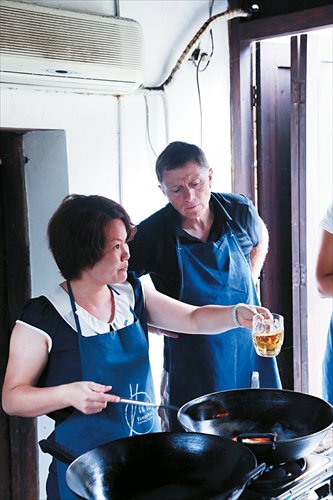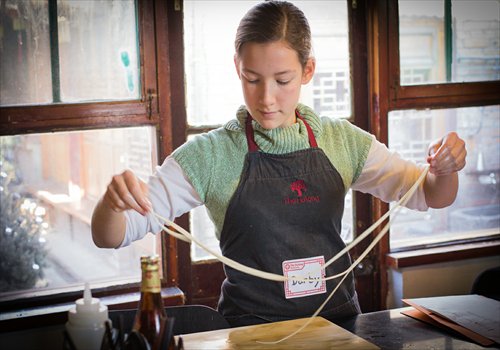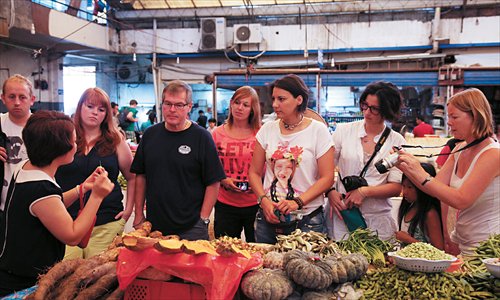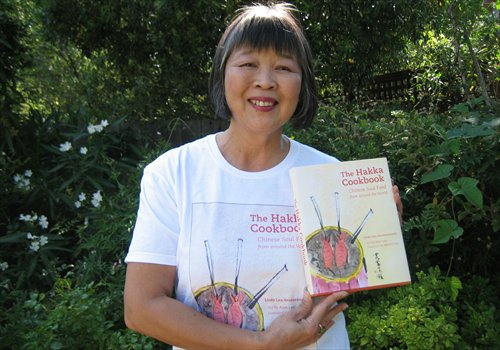Sweet and sour cooking classes
Foreigners show appetite for learning Chinese cuisine

A culinary instructor in Guilin, Guangxi Zhuang Autonomous Region, teaches a foreigner how to make a dish from the region. Photo: CFP
His brow furrowed in concentration, Michael Crain attends to the finicky task of chopping pork in to mince. No stranger to a cleaver, Crain's hand rises and falls with near mechanical precision, the steady pitter-patter of knife on chopping board filling the small classroom as the teacher mills about offering encouragement and advice to students.
Crain, 42, is a senior consultant with Bingham Consulting as well as the director of administration for Bingham McCutchen LLP's Beijing office, but at the moment, his only role is that of a man learning to make baozi (steamed buns). This is the 10th Chinese culinary class he's taken at The Hutong, a privately-run Chinese cultural center in Dongcheng district.
The difficulty with baozi, Crain explains, is not in preparing the meat filling, but in making the bun.
"All the folds that go on top have to be done in a particular way. They have to look neat and attractive as well as keeping the stuffing spilling," said Crain.
Crain used to enjoy watching Asian-American celebrity chef Ming Tsai on television, but said his motivation for taking Chinese cooking classes stemmed from his desire to understand Chinese people and culture. "You can connect to someone better if you understand their cuisine and their background. Once you realize how they were brought up and how their parents were brought up, it is easy to understand them."

A girl learns to make noodles at The Hutong in Beijing. Photo: Courtesy of The Hutong
Cooking classes for laowai
A number of places in Beijing offer English-language culinary instruction in China's various regional cuisines.
In addition to The Hutong, which organizes between three and five cooking classes each week, Black Sesame Kitchen, the China Culture Center and Hutong Cuisine Cooking School run classes with varying regularity.
"I've known about The Hutong for a long time," said Crain. "My wife had taken classes there initially. I had classes at other places like Black Sesame Kitchen, and hotels sometimes run Chinese cooking classes too."
At the Hutong School, aspiring amateur chefs are given the opportunity to be exposed to a wide variety of cuisines from all over China, from the tongue-numbing chili and peppercorn-based recipes for which Sichuan dishes are most famous, to the more delicate, aromatic fare of Yunnanese food. Their teachers include both professionally trained chefs, as well as experienced home cooks whose recipes are inherited from their families.
"We are interested in making delicious Chinese home style food, which doesn't necessarily require a trained chef to be the teacher," said Morgan O' Hara, the general manager of The Hutong.
Classes are thorough without assuming any prior knowledge of Chinese food, making them suitable for absolute beginners as well as more seasoned home cooks. A typical class will begin with a tour of a nearby street market so students can learn how to pick ingredients, followed by a demonstration of basic knife skills and step-by-step instruction on how to prepare a dish.
"Besides teaching cooking skills, we also tell students stories about the cultural background behind the food," said Sophia Du, who has been teaching at The Hutong from the time they started offering cooking classes six years ago.
"There's a message to everything," adds Crain. "For example, today we talked about the differences between the north of China and the south of China."
"Food is such a big part of the culture here."
Class sizes range from anywhere between four and 20 students, said Du, and attendees come from a wide range of backgrounds, from house wives to white-collar workers, travelers to students.
A single class at the Hutong School lasts two and a half hours, costing between 200 and 250 yuan ($32-$40).

Foreigners are guided through a local food market in Guilin, Guangxi Zhuang Autonomous Region. Photo: CFP
Celebrity chefs
As well as the emergence of local culinary schools in Beijing, a handful of prominent cookbook writers and television personalities in the West have played a significant role in whetting foreigner's appetites for cooking Chinese cuisine.
Fuchsia Dunlop, who gave a public lecture about Chinese cooking in Beijing this May, is arguably the best-known English food writer of Chinese cuisine in the West. British by birth, Dunlop has immersed herself in Chinese cooking for the past two decades.
"Obviously, China has a very complex and sophisticated cuisine, or in fact, cuisines," said Dunlop. "For beginners, it's best to start with everyday dishes that do not require too many unfamiliar ingredients, that are not too difficult to make, but are extremely delicious."
Dunlop first came to China in 1994 after winning a British Council scholarship to study Chinese in Chengdu. While there, she ingratiated herself to the local chefs working in the cramped little kitchens near her university, before becoming the first Westerner to train as a chef at the Sichuan Institute of Higher Cuisine.
"It was certainly an unusual situation, to be the first Western student in a Sichuan cooking school, in a class of mainly Sichuanese young men," recalls Dunlop.
"Some of my classmates were unsure as to how to deal with a foreigner and it was tough at first, learning exclusively in Chinese. But my teachers were wonderful, and I enjoyed the cooking so much that I didn't mind the difficulties."
Dunlop has since written a number of books about Chinese cuisine, including Revolutionary Chinese Cookbook and Every Grain of Rice: Simple Chinese Home Cooking. Her work has also appeared in US-based culinary bibles Gourmet and Saveur, and she is a regular guest on television shows focusing on food around the world.
Another food writer who has done her fair share of promoting Chinese cuisine in the West is American-born Linda Lau Anusasananan. Anusasananan is the author of The Hakka Cookbook: Chinese Soul Food From Around the World, and hosts a video series dedicated to Chinese cuisine on food and fitness website grokker.com.
Anusasananan's philosophy to teaching Westerners how to cook Chinese food, like her book, is grounded in down-to-earth experiences found in everyday life.
"Most Westerners I know like to eat Chinese food," said Anusasananan. "If they've eaten and liked the food, they are more likely to be interested in learning how to cook it."
"It is important to make the recipe accessible to the cook," Anusasananan added.
"If the cook succeeds and produces a delicious dish that everyone loves, he or she is likely to want to cook again."

Chinese-American food writer Linda Lau Anusasananan. Photo: Courtesy of Linda Lau Anusasananan
Chinese food in the West
Another possible reason for the popularity of English-language Chinese cooking classes in Beijing is the fact that Chinese restaurants are a staple in many foreign countries.
In addition to this is the fact that diversity of Chinese food in the West has grown massively in the past two decades, according to both Dunlop and Anusasananan.
"Instead of just Cantonese food, we have very authentic Sichuan, Hunan, Dongbei (Northeast China) and Guizhou food, at least in London," said Dunlop.
Like London, San Francisco is also home to a smorgasbord of Chinese restaurants, said Anusasananan.
"Sichuan, Hunan, Shanghai and Cantonese cuisines are popular," Anusasananan said.
"Hong Kong-style coffee shops and noodle shops offer casual options. People love Cantonese dim sum, and Northern-style boiled dumplings are also popping up."
As a case in point of the ubiquity of Chinese cuisine around the world, Crain suggested that his interest in Chinese food predated his migration to China eight years ago.
"I've always loved cooking and eating Chinese food," said Crain.
However, while foreigners in Beijing learn how to prepare everyday Chinese culinary classics, Huang Ching-he, who appears on UKTV television show Great Food Live and several other food-related programs on the BBC, suggested that this was only the beginning.
Because of the saturation of Chinese cuisine in West nowadays, it needs to modernize and transform, according to Huang.
"Chinese food needs a revival," said Huang.
"The world has moved on and is moving at an even faster pace. People are more discerning than ever and are craving more exciting and interesting creations that are complex in flavors and technique, and that deliver highly on taste."
"There is plenty of opportunity to innovate and fuse Chinese cuisine with other cuisines," said Huang.
Huang has, at least, one supporter in Crain.
"It's fun to take elements of the West and mix it in when cooking Chinese food," said Crain. "I like to be able to fuse the two."
Marina Yang contributed to this story